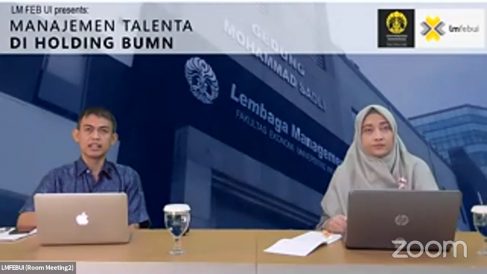LM FEB UI Webinar Series, “Talent Management in SOE Holdings”
Nino Eka Putra ~ PR of FEB UI
DEPOK – (3/8/2020)
On Monday (3/8/2020), the Management Institute of the Faculty of Economics and Business, Universitas Indonesia held a webinar series, entitled “Talent Management in SOE Holdings”.
Management of Human Resources (HR), including talent management, is currently competency-based. In the overall corporate governance process, talent management in SOEs has entered into a new chapter. Challenges and opportunities emerge not only on programs and systems that focus on the target of strengthening and developing superior human resources, starting from the first time they join the company (on boarding), until when they are already in the company, to finally when the company succeeds in creating added value and is able to attract the best candidates to enlist.
The resource person for this LM FEB UI webinar series was Niken Ardiyanti, M.Psi. She is a psychologist as well as an LM FEB UI Consultant. The moderator was Mone S. Andrias, Ph.D., Consultant of LM FEB UI.
Niken Ardiyanti stated that the goals and strategic steps for establishing a holding entity in an SOE are to increase value, strengthen competitiveness, expand business networks, and independence in managing SOEs. In addition, by strengthening SOE institutions and working mechanisms, as well as improving administrative orderliness by improving the administration process, 7 SOE holding companies have been successfully formed. These include SOEs for the fertilizer (1997), cement (2012), plantations (2014), mining (2017), oil and gas (2018), pharmacy (2019), and insurance (2020) businesses.

Basically, talent management is an HR management activity that seeks to achieve the company’s strategic operational goals effectively, and focuses on the optimal portfolio of talented human resources. In addition, managing superior human resources in the correct way will consistently increase the comparative advantage value for the company.
Niken stated that “The role of the middle manager as a change agent for talent management in the company begins with the activities of gathering and managing information, determining and directing alternative solutions, managing and coordinating internally and across functions, to translating business strategy into action plan initiatives.”.
Meanwhile, strategic opportunities for management in the company focus on developing the soft skills capabilities of middle managers, to act as agents of change in implementing talent management in the company. Development is carried out through providing feedback, minimizing gaps between roles, functions, and development opportunities with organizational requirements. Commitment to change comes from top management, as the leaders and driving force for the momentum of change. Top management ensures that all decision-making considerations refer to the insights obtained from the data.
Niken concluded the session by stating that “There are three aspects in the challenges of managing talent management. The first is administration in terms of systems and procedures for the main tasks and functions. Second, adaptation in functional and managerial technology-based HR systems. Third, acceleration of strategic competences, business, change management, data analytics and science, big data, and the Internet of Things (IoT) “. (hjtp)




